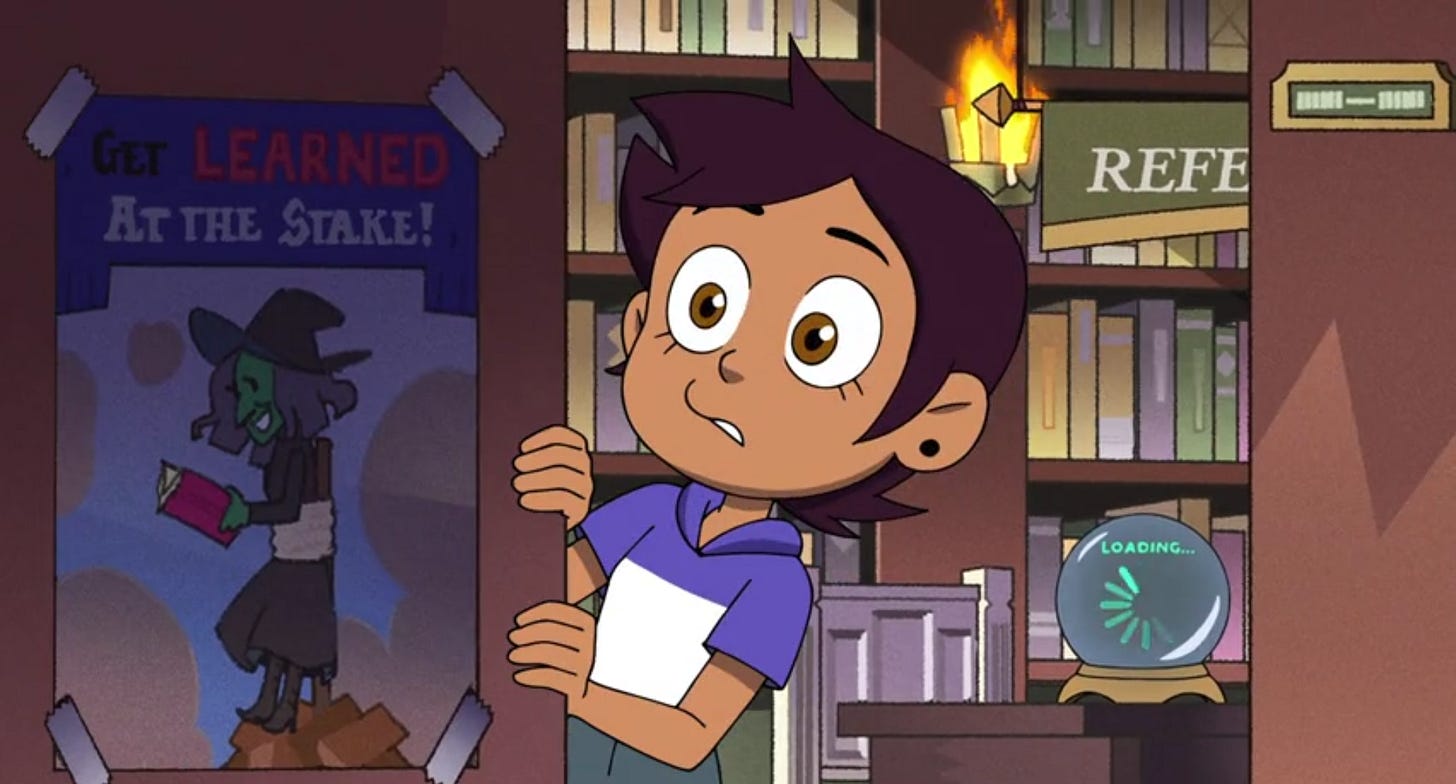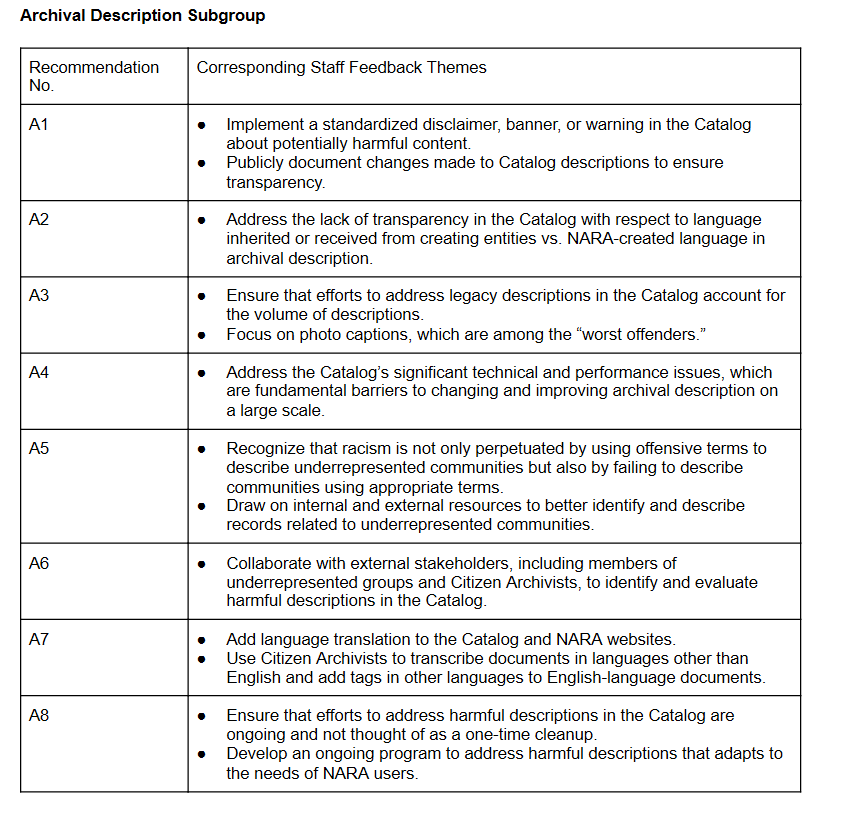NARA's new report on systemic racism, libraries in popular culture, genealogy, history, and more
This week I'll be writing about the same topics as always in this special Juneteenth newsletter, published on Saturday rather than Sunday as I usually do. Enjoy!

Hello everyone! I hope everyone had a good week. Happy Juneteenth! While Neely Tucker of the Library of Congress describes the history of Juneteenth, an illustration by Charis JB, noted rightly that the recognition of Juneteenth is performative despite its importance as celebrating the end of slavery (even though slavery didn’t end on that day) in Confederate states. In the past week, I’ve written about Archie the Archivist and preservation of analog data in Regular Show, and another blogpost focused on the value of knowledge, librarians, and abandoned libraries in two animated series. With that, let me move to the rest of my newsletter.
Earlier this week, NARA released recommendations for combating racism in museum exhibits, employment, and archival descriptions from an internal task force called the Archivist’s Task Force on Racism, which was chartered, last summer, by David Ferriero, the Archivist of the United States. Recommendations proposed by the Archival Description Subgroup include collaborating and consulting with “underserved and underrepresented communities,” engaging in “comprehensive reparative description program” to ensure that historical records are “described using respectful, accurate, and discoverable terminology,” coupled with focusing digitization efforts on “records related to underrepresented communities.”
Pages 12-16 of the full report, further lay out changes such as developing “an alert for online users regarding potentially harmful content in the NARA Catalog,” reviewing the “list of racist and otherwise harmful terms that have been identified in the Catalog,” improving technology and interface of the catalog, correcting “under-described and over-described records in the Catalog,” and developing a dedicated working group to ensure the recommendations are addressed “continually addressed as a program rather than a one-time project.” On another page, it is stated that “racism is embedded in the history and current practices of NARA,” noting that dismantling this structural racism will “require vast changes to NARA’s work culture at every level as well as an ongoing and active commitment to anti-racist work throughout the agency’s future.” Hopefully, these recommendations can be translated into action and NARA can move forward in a positive way, but people should push NARA to fulfill these commitments, not take it for granted that they will be fulfilled on their own.
For those further interested, the detailed recommendations of the Archival Description Subgroup is on pages 74-95 of the report sent to Ferriero in mid-April. As such, it wasn’t revised to note that NARA’s Seattle facility will not be closing, a closure halted on April 8.
Speaking of Seattle, on June 11, Ferriero published a post about the importance of acknowledging that NARA’s federal records center there sits on ancestral Indigenous land, specifically the Coast Salish, Stillaguamish, Duwamish, and Suquamish peoples. The closure of the facility was not mentioned in that post, but I imagine it is talked about internally within NARA. I don’t doubt that for a second.
Samantha “Sam” Cross reviewed archives in a comic featuring Batgirl, and I told her it reminded me of scrolls stuck inside of a tree in some episodes of Tangled. So, that was a nice conversation, and it connects to one of my recent posts which looks at library/archives confusion in the webcomic, Spells from Hell, noting the difference between NARA and the Library of Congress. One of my colleagues at the NSA published detailed transcripts from eight former U.S. ambassadors to Moscow, noting various perspectives on U.S.-Russia relations, while Zuzana Malicherova of the Europeana Foundation wrote about the future of audiovisual archiving, Margot Note highlighted the importance of archival description, outgoing SAA executive director Nancy Beaumont wrote on her accomplishments at the SAA while there for the last 10 years, a website jointly created by the Oregon Heritage Commission, the State Library of Oregon, and Washington State Library called Northwest Digital Heritage which offers “users free access to 80,000 historical and cultural records from 60 institutions in Oregon and Washington” was just launched, and some archivists are collecting documentation about the LGBTQ community in Nashville.
Then we get to libraries. Jennifer Snoek-Brown wrote about her wonderful blog, Reel Librarians, getting cited in scholarly discussion of reel librarians in Library Quarterly, Journal of Information Management, and Archivaria. There was also a presentation by K.C. Boyd about how to be an “advocate for your library and became an activist” as a librarian, on June 10, the New York legislature passed the library e-book bill, and on June 13, CNN examined whether venerable libraries get the credit they deserve. There were also a discussion about attempts by some to censor LGBTQ content in a public library, articles on OverDrive acquiring Kanopy in a deal which some called a “media empire,” finding the oldest library, and the Library of Congress (LOC) making it easier to preserve culturally important video games, as described by SYFY. Bloggers for LOC wrote about many important topics. This included assessing the impact of sanitizing products on their collection items, concluding that “cleaning and sanitizing products should not be applied directly to paper, parchment, or bound books” as should be common sense, the re-opening of some reading rooms, updates to the Congress.gov website, engaging in preservation by using raman spectroscopy, and a new primary source set for teachers which focuses on LGBTQ activism and contributions.
With that, there are some posts and news about genealogy to share. For one, Ancestry.com, as I’ve mentioned before, won the case about digitizing people’s personal yearbooks, with the judge saying that the website did not “take advantage of any private data” when doing so and arguing that the “yearbook pictures are not private enough to warrant special protections.” So, remember that next time when you think your yearbook has private information! Otherwise, there were interesting posts about exploring UK Census records, Paul Chiddicks writing about the value of obtaining death certificates for your ancestors, and, from Megan Smolenyak, a post from a couple years ago, examining amazing women in Stephen Colbert’s family tree. I enjoyed reading about sorting out messes in your family tree (the person in the post has a tree with over 29,000 ancestors! That’s a lot to keep track of!), value of source citations, the importance of extracting, transcribing, and abstracting genealogical documents, and a project which is attempting to capture genetic diversity among humans and catalog missing DNA. Most fascinating of all was a post by Paul Chiddicks asking what you will leave behind for others in the future.

As always, Smithsonian magazine covered the gamut when it comes to historical topics, with articles on how Ancient Greek armies relied on foreign mercenaries, World War I artifacts revealed by a melting glacier in the Italian Alps, the ill-fated idea to move the U.S. capital to St. Louis following the end of the Civil War, how the statue of Edward Colston that people rightly threw in a harbor in June of last year is now sitting in an English museum, and the story of what happened to Japanese American houses during incarceration, with homes of these citizens “ransacked, defaced, and even looted” with a survey after the war estimating that “80% of goods and property stored with private, non-government entities were ransacked, stolen, or sold”! Just as important were stories about teaching history with newsreels, preserving Indigenous history, and the official state sterilization and eugenics program in North Carolina which wasn’t ended until the 1970s, as noted in a thread by Sarah Carrier, a librarian in special collections and archives, in a Twitter thread.
There are a number of other topics which don’t easily fit into other parts of this newsletter but should still be mentioned. The Associated Press announced that they will “no longer run the names of people charged with minor crimes, out of concern that such stories can have a long, damaging afterlife” online, while still naming those who engage serious crimes like “those involving violence or abuse of the public trust, or cases of a fugitive on the run.” It will be interesting to see if other news outlets follow suit. Teen Vogue wrote about the problems of saying that going through toxic work environments is a “rite of passage” while an opinion piece in The Diamondback called for “collective reckoning with mental health in the workforce.” In the same publication it was noted that over 500 UMD employees signed petition demanding “expanded access to telework.” Perspectives on History examined the issue of colorizing photographs from the past and the ethics of making history, the American Historical Association objected to a Texas bill which would whitewash teaching of U.S. history in schools, the Chronicle of Higher Education said that professors want more guidance on how to help their students struggling with mental health, and Smithsonian magazine explained why scientists are studying the genetic tricks of the longest-lived animals and a Frida Kahlo retrospective debut in Chicago suburbs. As always, The Nib had some relevant illustrations. Some of the ones I read this week focused on Bill Gates relationship with Jeffrey Epstein, appreciation of music during the pandemic, the tale of the so-called “Somerton Man,” McDonald’s being hit by a huge data breach, the fallacy of so-called centrism lampooned by Tom Tomorrow, attacks on protesters with vehicles (vehicle-ramming) on the rise across the U.S., and a setback from the Supreme Court of backing a Catholic foster care agency in Fulton v. Philadelphia, which denied LGBTQ patients. This case, I’d say, endangers LGBTQ people going forward, despite GLAAD falsely declaring it is a “victory,” as it sets the groundwork for so-called “religious freedom” rights of religious institutions to be honored by government entities in the years to come, despite the fact the ruling is limited to this single instance and not more broadly.
That’s all for this week. I hope you all have a productive week ahead!
- Burkely



